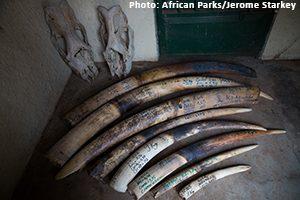
Some of 113 elephant tusks recovered by wildlife rangers in Garamba National Park in the northern Democratic Republic of Congo, November 18, 2015.
Note: This blog contains excerpts from the report.
Today, the Enough Project published a report, “Deadly Profits: Illegal Wildlife Trafficking through Uganda and South Sudan,” by Ledio Cakaj and Sasha Lezhnev. After following the trail of illegally poached elephants, pangolins, and other wildlife that benefit armed groups in Garamba National Park, the Enough Project went to the region to better understand where the wildlife was trafficked to. We found that South Sudan and Uganda are critically important, highly lucrative hubs for illegal wildlife trafficking. Without these countries, the wildlife would never get to its end destinations in Asia, and yet such middle countries are often ignored in the policy solution.
Earlier this year, 1 ton of ivory was seized at Uganda’s Entebbe airport, following another 1.3 tons that went missing from the Uganda Wildlife Authority stocks in 2009 to 2014, and 5 tons have been seized at the Juba airport over the past 3 years.
Uganda has begun to take important steps to combat this deadly trade, with the institution of a wildlife court which has begun to convict army officers and others, and new high-level investigations into ivory trafficking, which South Sudanese and Sudanese armed units and poachers and the Lord’s Resistance Army profit from. But South Sudan has done little, and more must be done in both countries to fight trafficking. Coming after the passage of the U.S. END Anti-Wildlife Trafficking Act in late 2016, the Enough Project hopes this report will spark new interest and policy action in the region.
Below are Enough’s recommendations:
- Increase accountability. The United States and European nations should urge the Ugandan government to follow up on high-level cases of wildlife trafficking in Uganda’s military, anti-corruption, or wildlife courts, as well as cases in South Sudanese courts, to help ensure that the cases move forward in their respective justice systems. U.S. Agency for International Development (USAID), the United Kingdom’s Department for International Development (DFID), Denmark’s Danida, and other donors should provide assistance to the Ugandan Ministry of Justice to expand the wildlife court and train judges in wildlife crimes. Training should include how to properly value wildlife, such that judicial sentences are appropriate to the scope of crimes committed.
- Combat poaching in and around Garamba. With U.S. Congressional support, the U.S. Department of Defense should authorize funding to support Garamba National Park rangers to help interdict the illegal poaching and wildlife trade from the Democratic Republic of Congo to South Sudan and Sudan. For example, with additional funding, AFRICOM could help provide technology to augment park rangers’ interdiction capability, such as night vision, thermal recognition, camera traps, and night-flying panels for helicopters over Garamba park. European military personnel and contractors, MONUSCO, and the U.S. Fish and Wildlife Service could also provide assistance. MONUSCO peacekeepers could also, in collaboration with FARDC military or Congolese police, conduct ‘stop and search’ operations of trucks suspected of transporting ivory by road.
- Follow the money. Justice authorities in the European Union, the United States, Uganda, and elsewhere with jurisdiction over individuals and companies suspected of high-level involvement in illegal ivory trafficking should investigate the most serious cases of trafficking, money laundering, and other related crimes. Financial intelligence units in the United States and Europe, banks, and other financial institutions should build on the study produced in mid-2016 by the Eastern and Southern Africa Anti-Money Laundering Group (ESAAMLG) to combat the laundering of the proceeds of trafficking through the international financial system. Sanctions authorities such as the U.S. Department of Treasury’s Office of Foreign Assets Control (OFAC) should pursue and designate key traffickers and their criminal networks.
- Maintain wildlife stocks. The U.S. Fish and Wildlife Service and European states should provide technical assistance to the Uganda Wildlife Authority (UWA) to ensure that wildlife stocks are kept safely in one or two depots, under the sole control and responsibility of UWA executives.
- Pass legislation with harsher penalties. The Parliament of Uganda should pass the revised Wildlife Act, which includes stiffer penalties for wildlife trafficking, that the Ugandan cabinet has now finished reviewing.
- Support local anti-trafficking groups. International donors and conservation authorities should increase support to local organizations in Congo, South Sudan and Uganda that carry out investigations of wildlife trafficking. Public-private partnerships may be applicable here.
Read the full report here.

